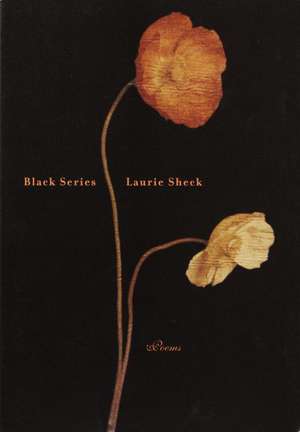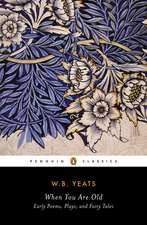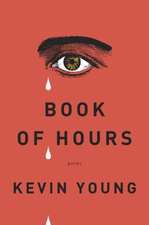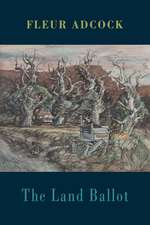Black Series: Poems
Autor Laurie Shecken Limba Engleză Paperback – 28 feb 2003
It’s the black night that wakes in me,
so dominant, so focused.
And then a car goes by and I think,
“I’m in the world,”
tires kicking up gravel from the dust.
What does the orange hawkweed do
inside this dark–its radiance
secretive but not extinguished?
To read this collection is to discover at every turn that secretive but undeniable radiance, and a language that is both riveting and distinctive.
From the Hardcover edition.
Preț: 95.70 lei
Nou
Puncte Express: 144
Preț estimativ în valută:
18.31€ • 18.100$ • 15.27£
18.31€ • 18.100$ • 15.27£
Carte disponibilă
Livrare economică 06-20 martie
Preluare comenzi: 021 569.72.76
Specificații
ISBN-13: 9780375709654
ISBN-10: 0375709657
Pagini: 112
Dimensiuni: 153 x 223 x 11 mm
Greutate: 0.21 kg
Ediția:Pbk.
Editura: Knopf Publishing Group
ISBN-10: 0375709657
Pagini: 112
Dimensiuni: 153 x 223 x 11 mm
Greutate: 0.21 kg
Ediția:Pbk.
Editura: Knopf Publishing Group
Notă biografică
Laurie Sheck is the author of three previous books of poetry, the most recent of which, The Willow Grove, was a finalist for the Pulitzer Prize. Her work appears widely in such journals and magazines as The New Yorker, The Kenyon Review and Boston Review. The recipient of fellowships from the Guggenheim Foundation, the National Endowment for the Arts and the Ingram Merrill Foundation, among other institutions, Sheck has been a member of the creative writing faculty at Princeton University and currently teaches in the M.F.A. program at the New School. She lives in New York City.
From the Hardcover edition.
From the Hardcover edition.
Extras
"The Subway Platform"
And then the gray concrete of the subway platform, that shore
stripped of all premise of softness
or repose. I stood there, beneath the city’s sequential grids
and frameworks, its wrappings and unwrappings
like a robe sewn with birds that flew into seasons of light,
a robe of gold
and then a robe of ash.
All around me were briefcases, cell phones, baseball caps,
folded umbrellas forlorn and still glistening
with rain. Who owned them? Each face possessed a hiddenness.
DO NOT STEP ACROSS THE YELLOW LINE; the Transit Authority
had painted this onto the platform’s edge
beyond which the rails
gleamed, treacherous, almost maniacal,
yet somehow full of promise. Glittery, icy, undead.
Sharp as acid eating through a mask. I counted forward
in my mind to the third rail, bristling with current,
hissing inside it like a promise or a wish; and the word
“forward” as if inside it also,
as if there were always a forward, always somewhere else
to go: station stops, exits, stairways opening out into the dusty
light; turnstiles and signs indicating this street
or that. Appointments. Addresses. Numbers and letters
of apartments, and their floors. Where was it, that thing I’d felt
inside me, tensed for flight
or capture, streaked with the notion of distance and desire?
And the people all around me, how many hadn’t
at some time or another curled up in their beds with the shades drawn,
not knowing how to feel the forwardness, or any trace
of joy? Wing of sorrow, wing of grief,
I could feel it brushing my cheek, gray bird
I lived with, always it was so quiet on its tether.
Then the train was finally coming, its earthquaky
rumblings building through the tunnel, its focused light
like a small fury. Soon we would get on, would step into
that body whose headlights obliterate the tunnel’s dark
like chalk scrawling words onto a blackboard.
I looked down at the hems of the many dresses all around me,
they were so bright! Why hadn’t I noticed them before? Reds
and oranges and blues, geometrical and floral patterns
swirling beneath the browns and grays of raincoats,
so numerous, so soft: “threshold,” I thought, and “lullaby,” disclosure,”
the train growing louder, the feet moving toward the yellow
line, the hems billowing as the train pulled up,
how they swayed and furrowed and leapt
as if a seamstress had loosed them like laughter from her hands–
"Circuits"
Again the dark begins to meddle with the buildings,
first softening then releasing them
that they might fold themselves back into concealment,
while the silences wander, inexhaustible, diverse,
hovering like shame and not like shame,
dispersing over neon-shattered streets.
But the programmed air is purposeful and sure; it doesn't wander.
It carries a deliberateness inside it,
a brittleness like wooden boxes.
In my neighbor's room, electronic voices soothe him,
and bodies made of an uncertain light
that pass back and forth through brief episodic disclosures.
No microbes live in them, or stenches--only a blue glow.
Each night they become their own erasures.
The circuits that guide me are smaller than I know.
What gaunt liberty this is, this waiting for headlines,
the flesh drenched in hearsay,
or the distant, lovely algebra of stars,
the offer that is good for one week only.
Outside, the raw data of the faces pass.
Someone is tearing a photograph in thirds. Someone
is laughing. Someone is stockpiling rage,
sharp words about to burst into the throat.
Where is the soundtrack? Where the poison dress to sting me clean?
How quiet chaos is. How tracelessly it enters.
From the Hardcover edition.
And then the gray concrete of the subway platform, that shore
stripped of all premise of softness
or repose. I stood there, beneath the city’s sequential grids
and frameworks, its wrappings and unwrappings
like a robe sewn with birds that flew into seasons of light,
a robe of gold
and then a robe of ash.
All around me were briefcases, cell phones, baseball caps,
folded umbrellas forlorn and still glistening
with rain. Who owned them? Each face possessed a hiddenness.
DO NOT STEP ACROSS THE YELLOW LINE; the Transit Authority
had painted this onto the platform’s edge
beyond which the rails
gleamed, treacherous, almost maniacal,
yet somehow full of promise. Glittery, icy, undead.
Sharp as acid eating through a mask. I counted forward
in my mind to the third rail, bristling with current,
hissing inside it like a promise or a wish; and the word
“forward” as if inside it also,
as if there were always a forward, always somewhere else
to go: station stops, exits, stairways opening out into the dusty
light; turnstiles and signs indicating this street
or that. Appointments. Addresses. Numbers and letters
of apartments, and their floors. Where was it, that thing I’d felt
inside me, tensed for flight
or capture, streaked with the notion of distance and desire?
And the people all around me, how many hadn’t
at some time or another curled up in their beds with the shades drawn,
not knowing how to feel the forwardness, or any trace
of joy? Wing of sorrow, wing of grief,
I could feel it brushing my cheek, gray bird
I lived with, always it was so quiet on its tether.
Then the train was finally coming, its earthquaky
rumblings building through the tunnel, its focused light
like a small fury. Soon we would get on, would step into
that body whose headlights obliterate the tunnel’s dark
like chalk scrawling words onto a blackboard.
I looked down at the hems of the many dresses all around me,
they were so bright! Why hadn’t I noticed them before? Reds
and oranges and blues, geometrical and floral patterns
swirling beneath the browns and grays of raincoats,
so numerous, so soft: “threshold,” I thought, and “lullaby,” disclosure,”
the train growing louder, the feet moving toward the yellow
line, the hems billowing as the train pulled up,
how they swayed and furrowed and leapt
as if a seamstress had loosed them like laughter from her hands–
"Circuits"
Again the dark begins to meddle with the buildings,
first softening then releasing them
that they might fold themselves back into concealment,
while the silences wander, inexhaustible, diverse,
hovering like shame and not like shame,
dispersing over neon-shattered streets.
But the programmed air is purposeful and sure; it doesn't wander.
It carries a deliberateness inside it,
a brittleness like wooden boxes.
In my neighbor's room, electronic voices soothe him,
and bodies made of an uncertain light
that pass back and forth through brief episodic disclosures.
No microbes live in them, or stenches--only a blue glow.
Each night they become their own erasures.
The circuits that guide me are smaller than I know.
What gaunt liberty this is, this waiting for headlines,
the flesh drenched in hearsay,
or the distant, lovely algebra of stars,
the offer that is good for one week only.
Outside, the raw data of the faces pass.
Someone is tearing a photograph in thirds. Someone
is laughing. Someone is stockpiling rage,
sharp words about to burst into the throat.
Where is the soundtrack? Where the poison dress to sting me clean?
How quiet chaos is. How tracelessly it enters.
From the Hardcover edition.
Recenzii
"Rarely, if ever, has the contemporary lyric been both so pure and so informed with varieties of experience; the historical and the mythic and the utterly everyday; crack addicts and Medusa and Goya, carpenter bees and graffiti, the blur of a xerox and the evocativeness of cave paintings; all conveyed with a startling precision of perception and reflection and locution. This is fine work, both delicate and bold."
--C.K. Williams
"An illuminated insight and wit highlight the deep-seeing of Laurie Sheck's Black Series. This is a seeing into things that is musical, a taking apart and putting-back-together that cast the human eye as godlike--almost Emersonian. What we think we know is imagistically probed till it reveals something we didn't know. In this sense, the poems in Sheck's wonderful book are "spies of light": they disrobe our senses so that each of us is Goya's apprentice, honing our skills to see in the dark. Here nothing is borrowed; each poem's imagery is direct, seldom beyond us, yet always challenging. We can all savor Black Series, an exhibition of lyrical surprises."
-Yusef Komunyakaa
"Laurie Sheck is a modern shaman, a storyteller who knows that the best stories are not those that merely entertain but those that accompany us long after their telling . . . Just as in ancient worlds myths offered the templates for negotiating a safe path through terrors natural and Olympian, Laurie Sheck's poems find embodiments for the maladies of the new millennium: anxiety and the terror of affluence, alienation in the midst of commerce, and the illusion of Free Will in the Free World. Imagine being plopped down in this civilization without prior knowledge of it; imagine having to map your way without any clues but those the mysterious person guarding the city gates chooses to give out. 'Listen carefully,' she whispers; and you do, because your life depends on it."
--Rita Dove, Washington Post Bookworld
From the Hardcover edition.
Descriere
This "haunting, beautiful collection" ("Library Journal") is by the author of"The Willow Grove, " a finalist for the Pulitzer Prize.








